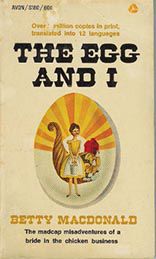As popular in her day as David Sedaris — and every bit as funny — Betty MacDonald (1908-1958) retains a small but devoted following of which I’m a proud member.
She’s perhaps best known as the author of “The Egg and I” (1945), the book that gave rise to the characters Ma and Pa Kettle.
But as the gap between the rich and the poor grows ever wider, the book I’m turning to again is called “Anybody Can Do Anything” (1950).
It’s about Seattle during the Depression and Betty’s wacky family — they’re all back home, living with their chain-smoking, novel-reading, mild-mannered mother — which is headed up by the oldest sibling, Mary, and how Mary gets Betty, who is divorced with two young daughters, a succession of odd jobs for which Betty is completely and utterly unqualified.
Here’s the conversation that ensues after Mary announces to Betty that she’s volunteered her for a job “at the Western Insurance Company being private secretary to a perfectly darling man named Welton Brown”:
“I tried to keep my voice normal as I asked, ‘Just what have you told this Welton Brown I could do, Mary?’
“Mary said, ‘Stop interrupting and you’ll find out. Because Welton gets out a magazine, his secretary has to be able to type and take shorthand, know all about insurance, be familiar with advertising and layouts, draw well enough to illustrate the magazine and be able to write and edit articles. He’d really prefer someone who’s been published.’
“‘Well,’ I said, ‘A) I’m only mediocre to rotten in shorthand and typing; B) I don’t know anything about advertising or layouts; C) I majored in art in college but we never drew anything but plaster casts; D) I can’t write and I’ve never had anything published and all my insurance information is mixed up with chickens.’
“Mary said, ‘Listen, Betty, I’ve known you for 24 years and you’ve never thought you could do anything. Now there’s a depression and jobs are hard to find and you’ve got two children to support and it’s about time you grew up and changed your thinking to things you can do instead of things you can’t do. Mull over your talents and build up your ego.’”
Mary then smartly rebuts each of Betty’s objections, ending with “E) You have to be able to write and that is one thing you have to admit you can do. What about your children’s stories — what about ‘Sandra Surrenders’ — I’ll bet the Ladies’ Home Journal would snap it up if we ever finished it.”
In short, this is an essential, useful book, recession or no. Its complete lack of self-pity and huge sense of fun (“No one likes a saddo,” Betty’s mother counsels) are character attributes to which all followers of the Gospels should aspire.
Betty ends up working as a photo tinter, an organizer for a rabbit grower, and a typer of bills for a florist, a dentist and a laboratory.
She works for an oil promoter, a public stenographer, a Mr. Wilson who runs a pyramid scheme and a gangster.
Mary’s also constantly setting Betty up on gruesome blind dates, and as the two of them good-naturedly dismiss the guy with roving hands as, “Oh that old raper,” and the elderly leach as “Probably just some lonely old buzzard who wants to meet some girls,” I couldn’t help reflecting upon how much we’ve lost in our own era of humorless political correctness.
For fun, the sisters (there are four of them, plus one brother) put on a pot of spaghetti, invite a crowd of artistes — some of whom end up staying for years — and crowd around the gramophone or piano singing, making fun of each other, smoking, drinking endless cups of coffee and putting on plays.
Actually, everyone in Betty’s family, including her, chain-smoked, which probably did not help stave off the tuberculosis that sent her to the sanitarium for a year and resulted in the also delightful memoir “The Plague and I” (1948).
Eventually, Betty remarries, moves to Vashon Island off the coast of Washington state, and begins working for a contractor with cost-plus government contracts.
She would later write “Onions in the Stew” about her time there. (I was thrilled recently to spend two nights at the Betty MacDonald Farm: the barn above the house has been converted to a bed and breakfast with a view of Puget Sound and a fir tree with a nesting bald eagle).
First, though, Mary convinces Betty to write a book about her adventures on the remote chicken ranch to which she’d moved with her first husband: a marriage that had ended when Betty matter-of-factly packed up her two young daughters one rainy morning, walked down the hill and boarded a bus for Seattle, never to return.
The book — “The Egg and I” — was accepted by J. B. Lippincott, serialized in the Atlantic Monthly, and the rest is history, thereby proving Mary’s theory that anybody can do anything, or as she triumphantly told Betty, “You just feel successful, but imagine how I feel. All of a sudden my big lies have started coming true!”
Would that we all had a sister Mary. And long live Betty MacDonald.

